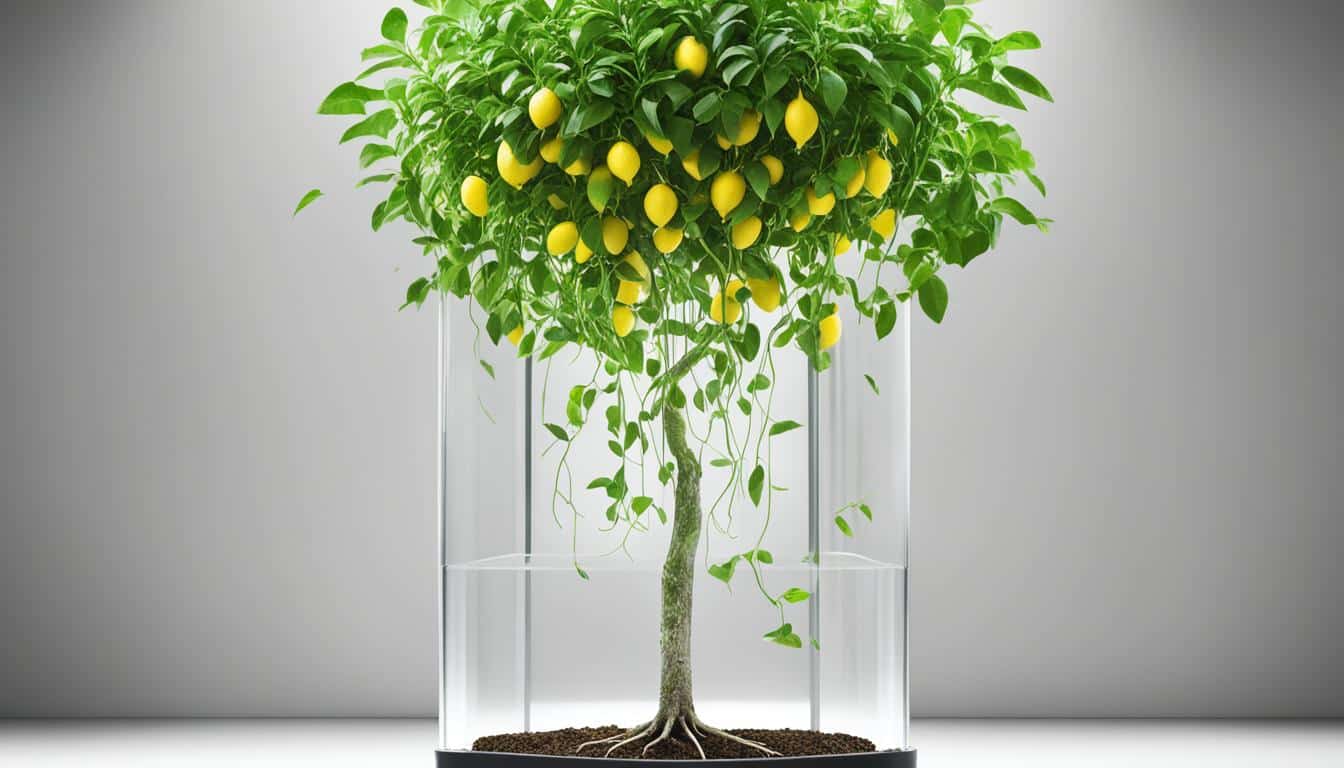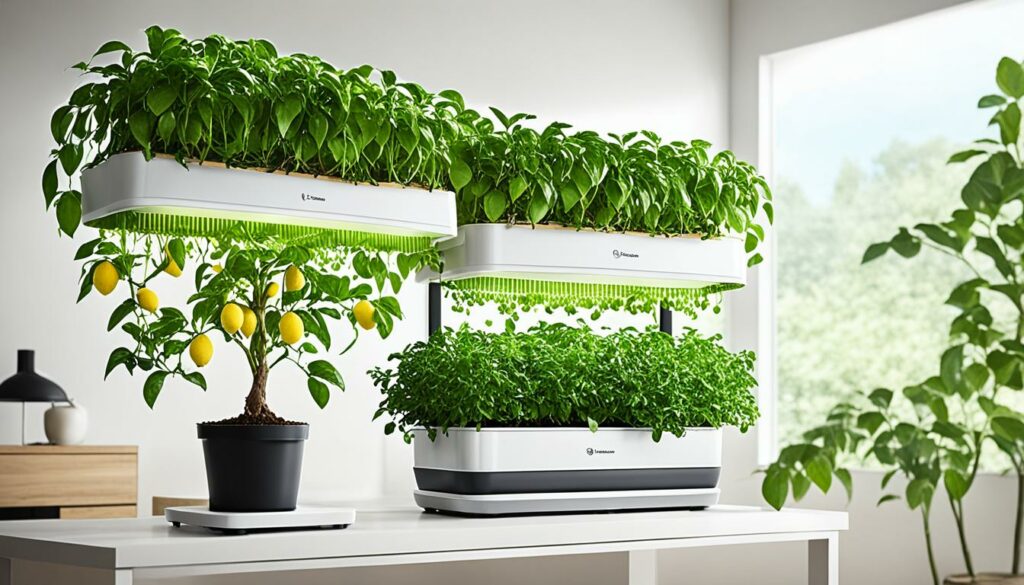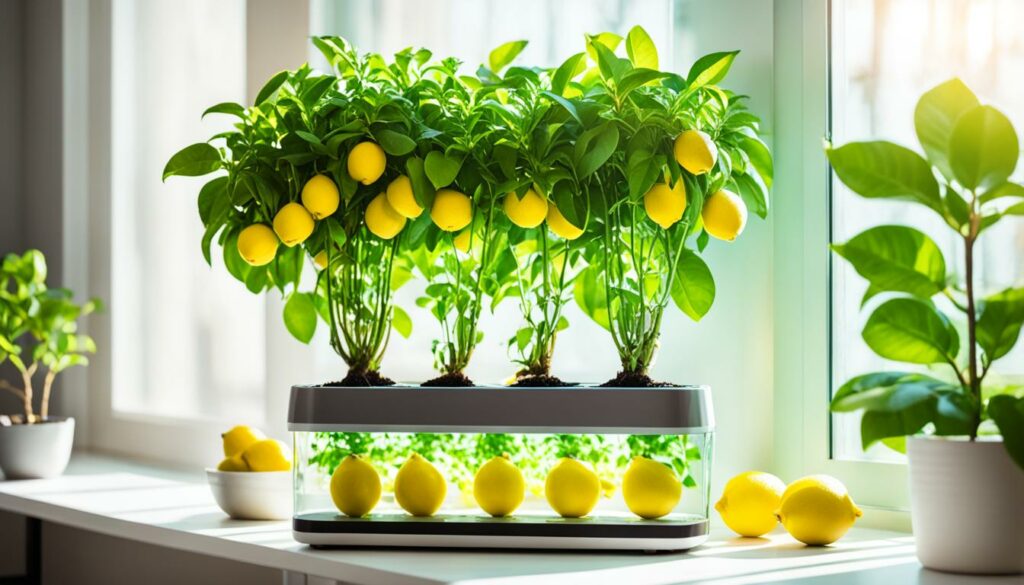
Welcome to the exciting world of hydroponic lemon tree cultivation! Imagine being able to enjoy the taste of fresh lemons all year round, right from the comfort of your own home. With hydroponics, this dream can become a reality. In this article, we will explore the wonders of growing lemon trees using hydroponic systems, allowing you to experience the joy and satisfaction of harvesting your own lemons.
Hydroponic gardening offers numerous advantages, especially for those with limited outdoor space. Whether you live in a small apartment or a house with no garden, hydroponic lemon tree cultivation enables you to create an indoor oasis and bask in the pleasure of homegrown lemons.
With hydroponics, you can take control of your lemon tree’s growth, ensuring optimal conditions for vibrant and healthy plants. By providing the perfect balance of nutrients, light, and water, you can expect faster growth, higher yields, and the convenience of minimal maintenance.
In the following sections, we will dive into the specifics of growing lemon trees hydroponically, choosing the best hydroponic system, providing proper care, and exploring the benefits of this rewarding gardening method. You will be equipped with all the information you need to embark on your hydroponic lemon tree journey!
Key Takeaways:
- Hydroponic lemon tree cultivation allows you to enjoy fresh lemons at home all year round.
- Hydroponics is ideal for those with limited outdoor space.
- By providing optimal conditions, hydroponics promotes faster growth and higher yields.
- Choosing the right hydroponic system is crucial for successful lemon tree cultivation.
- Proper care, including adequate lighting, temperature, and nutrient balance, ensures healthy lemon tree growth.
Growing Lemon Trees Hydroponically
Hydroponic gardening has revolutionized the way we cultivate plants, offering numerous advantages over traditional soil-based methods. In this section, we will explore the exciting world of growing lemon trees hydroponically, allowing you to enjoy the fresh taste of lemons right in your own home.
When it comes to hydroponic lemon tree cultivation, knowledge about the different types of hydroponic systems available is essential. Let’s dive into some of the options:
- Deep Water Culture (DWC): This system involves suspending the lemon tree roots in a nutrient-rich solution, allowing them to absorb water and nutrients directly. It’s a popular choice for beginners due to its simplicity and low-cost setup.
- Nutrient Film Technique (NFT): In this system, a thin film of nutrient solution continuously flows over the roots of the lemon tree, providing a constant supply of water and nutrients. NFT systems promote faster growth and increased oxygenation of the roots.
- Drip Irrigation: This system involves periodically supplying a nutrient solution to the roots of the lemon tree through drippers or emitters. Drip irrigation allows for precise control of nutrient delivery, ensuring optimal growth and nutrient uptake.
Each hydroponic system has its advantages and considerations, so it’s important to choose the one that best suits your needs and available space.
Hydroponic cultivation offers several benefits when it comes to growing lemon trees:
- Faster Growth: Hydroponic systems provide an ideal environment for lemon tree growth, allowing them to grow faster compared to traditional soil-based methods.
- Higher Yields: With precise control of nutrient levels and environmental conditions, hydroponic lemon trees tend to produce higher yields of juicy lemons.
- Optimal Nutrient Control: One of the key advantages of hydroponic gardening is the ability to tailor the nutrient mix to the specific needs of the lemon trees. This ensures they receive the right balance of nutrients for optimal health and productivity.
Now that you have a better understanding of the basics of growing lemon trees hydroponically, the next section will guide you in choosing the best hydroponic system for your lemon tree cultivation.
Choosing the Best Hydroponic System for Lemon Trees
When it comes to growing lemon trees hydroponically, choosing the right hydroponic system is crucial for the success of your cultivation. In this section, we will explore different factors to consider when selecting the best hydroponic system for your lemon trees.
1. Space Available: Assess the space you have in your home for your hydroponic setup. If you have limited space, a compact system like a vertical tower or a small DWC (Deep Water Culture) system might be ideal.
2. Budget: Determine your budget for a hydroponic system. Keep in mind that different systems have varying costs, ranging from affordable DIY options to more advanced commercial setups. Consider the long-term investment and maintenance costs when deciding.
3. Maintenance Requirements: Evaluate the level of maintenance you are willing to commit to. Some systems require regular monitoring of pH and nutrient levels, while others are more automated. Choose a system that aligns with your time and effort availability.
By considering these factors, you can narrow down your options and make an informed decision on the best hydroponic system for your lemon tree cultivation.
Comparison of Hydroponic System Options:
| System | Space Requirement | Cost | Maintenance | Pros | Cons |
|---|---|---|---|---|---|
| Deep Water Culture (DWC) | Medium to High | Medium | Regular monitoring | – Provides excellent aeration – Affordable |
– Requires larger space – Manual maintenance |
| Ebb and Flow | Medium | Medium | Moderate | – Simulates natural watering – Versatile |
– Limited plant capacity – Requires periodic flooding |
| Aeroponics | Low to Medium | High | High | – Maximized oxygen delivery – Rapid plant growth |
– Expensive setup – Delicate misting system |
| Vertical Tower | Low | Low to Medium | Low | – Space-efficient – Easy to assemble |
– Limited number of plants – Requires frequent watering |
Consider the advantages and disadvantages of each system to determine which one aligns best with your specific needs and preferences for growing lemon trees hydroponically.

With this information in hand, you are now equipped to choose the best hydroponic system for your lemon tree cultivation. The right system will provide a suitable environment for your lemon trees to thrive, ensuring a bountiful supply of fresh lemons throughout the year.
Lemon Tree Care Tips for Hydroponic Cultivation
Proper care is essential for the successful growth of hydroponic lemon trees. In this section, we will provide you with valuable tips and techniques to ensure your lemon trees thrive. From lighting and temperature requirements to nutrient balance and pruning, you’ll discover how to create an optimal environment for healthy and productive lemon tree growth.
Lighting and Temperature Requirements
Providing the right lighting and maintaining an optimal temperature is crucial for the growth of your hydroponic lemon trees. Here are some key considerations:
- Place your lemon trees in an area that receives at least 8 hours of bright, indirect sunlight per day. If natural sunlight is insufficient, consider using grow lights to supplement the light.
- Ensure that the temperature is consistently between 70°F and 85°F (21°C to 29°C) during the day and no lower than 55°F (13°C) at night.
- Monitor the humidity levels and aim for a range of 50% to 70% to provide optimal conditions for growth.
Nutrient Balance
In a hydroponic system, it’s crucial to maintain a proper nutrient balance to support the growth and development of your lemon trees. Consider the following:
- Choose a high-quality hydroponic nutrient solution specifically formulated for citrus trees.
- Follow the recommended dosage instructions and adjust as needed based on the growth stage of your lemon trees.
- Regularly monitor the pH level of the nutrient solution and ensure it remains in the ideal range of 5.5 to 6.5 for optimal nutrient absorption.
Pruning and Training
Pruning and training your lemon trees promote healthy growth, maintain shape, and improve fruit production. Here’s what you need to know:
- Prune your lemon trees regularly to remove any dead or diseased branches, as well as to improve air circulation within the canopy.
- Train your lemon trees to have an open center shape, allowing sunlight to reach all parts of the tree.
- Remove any suckers or water sprouts that grow at the base of the tree or along the branches. These can divert energy from the main plant.
Proper care, including providing the right lighting, maintaining a nutrient balance, and regular pruning, is key to the success of your hydroponic lemon trees. By following these care tips, you’ll be rewarded with healthy, productive lemon trees that yield an abundance of delicious fruit.
Now that you have learned the essential care tips for your hydroponic lemon trees, you are well-equipped to create an optimal environment for their growth. Implement these techniques, and soon you’ll be enjoying the sight of fresh lemons growing right in the comfort of your home.
Indoor Lemon Tree Cultivation Guide
When it comes to growing lemon trees, you don’t need a vast outdoor garden. With indoor lemon tree cultivation, you can enjoy the refreshing scent of citrus and the satisfaction of harvesting your own lemons right in the comfort of your home. In this section, we will provide you with a comprehensive guide on how to grow lemon trees indoors, ensuring a flourishing and fruitful indoor garden.
Creating the ideal indoor environment is crucial for the successful cultivation of lemon trees. Here are some key considerations:
Lighting:
Lemon trees require ample sunlight for healthy growth and fruit production. However, since indoor environments may not provide sufficient natural light, supplementing with artificial lighting is essential. Invest in full-spectrum grow lights and position them approximately 6-12 inches above the lemon tree to mimic natural sunlight. Provide 10-14 hours of light per day to promote optimal photosynthesis and growth.
Humidity:
Lemon trees thrive in humid conditions, similar to their natural habitat. To maintain adequate humidity levels indoors, consider using a humidifier or placing a tray of water near your lemon tree. This helps to prevent dryness, especially during the winter months when indoor heating systems can reduce humidity.
Ventilation:
Adequate air circulation is necessary for healthy lemon tree growth. Ensure proper ventilation by placing your lemon tree in a well-ventilated room with good airflow. Avoid areas with excessive drafts or stagnant air.
Now, let’s dive into the fascinating world of indoor lemon tree pollination:
Pollination:
Lemon trees are self-pollinating, meaning they can produce fruit without the need for cross-pollination from another tree. However, indoor environments may lack the presence of natural pollinators like bees. Fortunately, you can easily hand-pollinate your lemon tree to ensure optimal fruit production.
To hand-pollinate your indoor lemon tree, gently transfer pollen from one flower to another using a small brush or cotton swab. Gently brush the center of one flower to gather pollen and transfer it to the center of another flower. Repeat this process for each flower on your lemon tree to enhance fruit development.
By following these indoor lemon tree cultivation guidelines, you can create the perfect environment for your lemon tree to flourish and produce an abundance of delicious lemons all year round.

| Indoor Lemon Tree Cultivation Tips: |
|---|
| Provide ample light with full-spectrum grow lights |
| Maintain humidity using a humidifier or tray of water |
| Ensure proper ventilation in the growing area |
| Hand-pollinate indoor lemon trees for optimal fruit production |
The Benefits of Hydroponic Lemon Trees
Hydroponic lemon tree cultivation offers numerous benefits beyond the convenience of growing indoors. In this section, we will explore the advantages of hydroponic gardening, including water conservation, space efficiency, and the ability to grow plants year-round. Discover how hydroponics can enhance your gardening experience and provide a sustainable source of fresh lemons.
One of the significant benefits of hydroponic lemon tree cultivation is water conservation. Unlike traditional soil-based gardening, hydroponics eliminates the need for excessive watering. The hydroponic system provides water directly to the plant roots, optimizing water usage and minimizing wastage.
Another advantage is space efficiency. Hydroponic setups can be tailored to fit any available space, making it an excellent option for those with limited outdoor areas or urban environments. By utilizing vertical growing systems, you can maximize your planting capacity and cultivate multiple lemon trees in a small footprint.
“Hydroponic lemon tree cultivation allows gardeners to enjoy a bountiful harvest of fresh lemons all year round.”
The ability to grow plants year-round is a significant benefit of hydroponic gardening. With proper lighting and climate control, you can create an optimal environment for lemon tree cultivation regardless of the season. This means a consistent supply of fresh lemons, even during winter months when traditional outdoor cultivation is not feasible.
Furthermore, hydroponics provides an ideal medium for growing high-quality lemons. By controlling nutrient levels, pH balance, and other environmental factors, you can support the growth of healthy and productive lemon trees. The absence of soil also reduces the risk of soil-borne diseases and pests, resulting in stronger, disease-resistant plants.
Investing in hydroponic lemon tree cultivation not only brings the joy of gardening but also offers a sustainable source of fresh lemons. By growing your own lemons at home, you reduce the need for transportation and packaging, contributing to a greener and more environmentally friendly lifestyle.
In summary, hydroponic lemon tree cultivation provides a range of benefits, including water conservation, space efficiency, year-round growth, and the ability to grow high-quality, sustainable lemons. It is an excellent choice for those looking to enjoy the rewards of gardening while embracing innovative and efficient growing methods.
Lemon Tree Nutrients for Hydroponics
Nutrition plays a crucial role in ensuring the health and productivity of hydroponic lemon trees. By understanding the essential nutrients required for optimal growth and how to maintain proper nutrient levels in a hydroponic system, you can create an environment that fosters a thriving and fruitful indoor garden.
Lemon trees, like all plants, require a variety of nutrients to support their growth and development. The primary macronutrients that lemon trees need in larger quantities are nitrogen (N), phosphorus (P), and potassium (K). These macronutrients are essential for promoting healthy foliage, strong root development, and the production of vibrant and flavorful lemons.
In addition to macronutrients, there are also secondary nutrients and micronutrients that lemon trees require in smaller quantities. Secondary nutrients include calcium (Ca), magnesium (Mg), and sulfur (S), while micronutrients encompass iron (Fe), manganese (Mn), zinc (Zn), copper (Cu), boron (B), molybdenum (Mo), and chlorine (Cl). These nutrients are critical for various physiological processes, such as photosynthesis, enzyme function, and overall plant health.
When cultivating lemon trees hydroponically, it is necessary to provide these nutrients directly to the root system. This can be achieved by using a nutrient solution that contains the appropriate balance of macronutrients, secondary nutrients, and micronutrients. This solution is carefully measured and adjusted to meet the specific nutritional needs of lemon trees.
Remember: Maintaining the correct nutrient balance is essential for preventing deficiencies or toxicities that can negatively impact the health and productivity of your lemon trees.
Here is a table summarizing the essential nutrients and their functions for hydroponic lemon tree cultivation:
| Nutrient | Function |
|---|---|
| Nitrogen (N) | Stimulates leaf and stem growth |
| Phosphorus (P) | Promotes root development and flowering |
| Potassium (K) | Aids in fruit development and overall plant vigor |
| Calcium (Ca) | Enhances cell wall strength and disease resistance |
| Magnesium (Mg) | Essential for chlorophyll production and photosynthesis |
| Sulfur (S) | Facilitates protein synthesis and enzyme activity |
| Iron (Fe) | Required for chlorophyll formation and nutrient uptake |
| Manganese (Mn) | Participates in enzyme systems and photosynthesis |
| Zinc (Zn) | Essential for hormone regulation and enzyme function |
| Copper (Cu) | Aids in carbohydrate metabolism and plant defense |
| Boron (B) | Supports cell division and pollen germination |
| Molybdenum (Mo) | Required for nitrogen fixation and enzyme systems |
| Chlorine (Cl) | Facilitates osmotic balance and water movement |
It is important to monitor the nutrient levels regularly and adjust the nutrient solution accordingly to maintain optimal conditions for your lemon trees. This ensures that they receive the necessary nutrients throughout their growth cycle, leading to healthy, vigorous plants and a bountiful harvest of delicious lemons.
By providing the right balance of nutrients, you can nurture your hydroponic lemon trees to thrive and produce an abundance of delightful citrus fruits right in the comfort of your own home.
Conclusion
In this article, we have explored the art of growing hydroponic lemon trees at home. With the knowledge gained from this guide, you now have the tools to embark on your own hydroponic lemon tree journey.
By selecting the right hydroponic system and providing proper care and nutrients, you can enjoy the pleasure of cultivating fresh lemons right in the comfort of your own home.
Experience the joy of savoring the fruits of your labor throughout the year, as you harvest your own homegrown lemons. Start your hydroponic lemon tree adventure today and enjoy the abundance and convenience of having fresh lemons at your fingertips.
